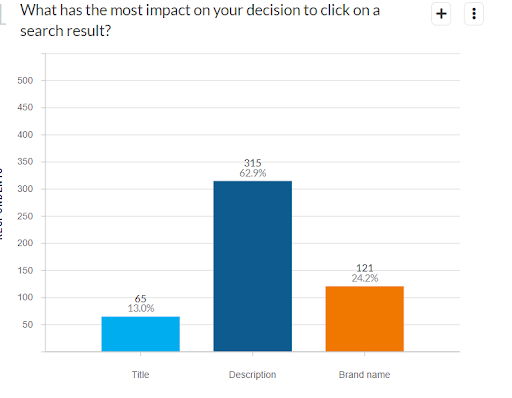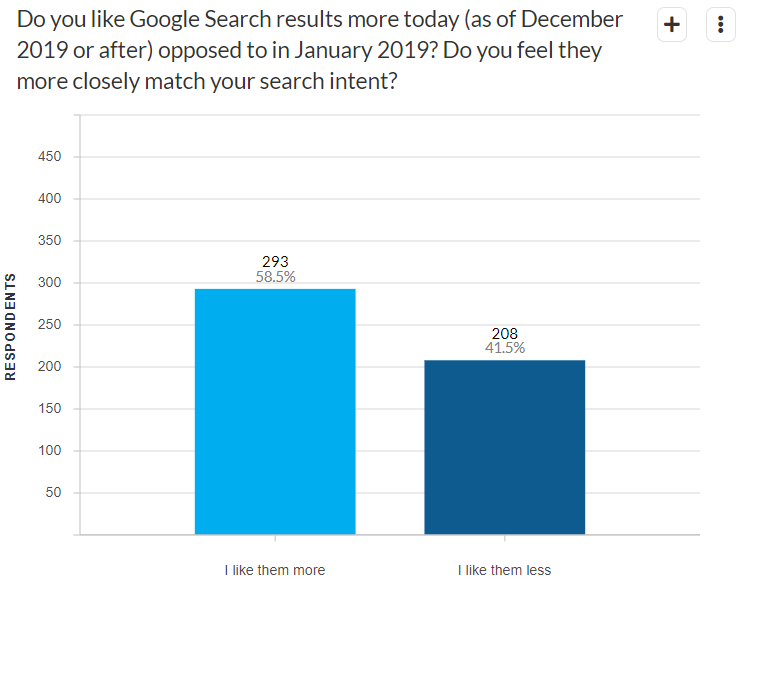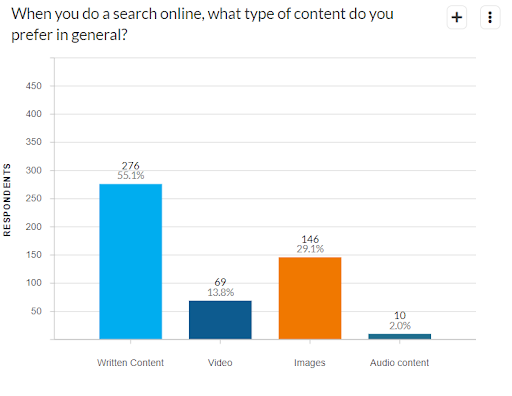What affects the Search CTR? Meta descriptions and brands on pole
What are the users looking for among Google’s search results and in what way do these results reflect search intent? These are the two questions used as base for a study carried out in the United States by Ignite Visibility, that allows us to acquire interesting info on the factors influencing the click through rate of the results ranking on Google, confirming the importance of some evergreen elements and offering useful food for thoughts.
What do we need to attract a click from the SERP
Extremely summing it up, the analysis of the american company (from which on-page images are drawn) reveals that the main alluring factor for users still is the page’s meta description, indicated by the 62.9% of people; in second place we find the name of the brand, influencing the 24.2% of users, while another 13% chooses because intrigued or convinced by the title.
There is another aspect to take into account, though, because the 55.1% of participants claimed to click only on a brand they are already familiar with among the one listed on search results.
The value of meta description and brand awareness
This is a kind of info that could practically affect our SEO activity and gives us the confirmation of how important it is to write compelling meta descriptions and work on brand awareness, because brand recognition has the second biggest impact on CTR and, then, it cannot be overlooked on a strategy for the improvement of organic visibility.
Ignite Visibility study
The big internet marketing company based in San Diego involved in its survey over 500 participants of age between 25 and 60 years old, asking a series of questions regarding their behaviour on Google and other more generical ones on the search engine.
Other takeways on the relationship between users and Google
There are indeed other key info emerging from this study, useful to understand what people really think of the search engine and its features.
Let’s start from those we can define as “good news for Google“: most part of users is satisfied with search results, thinks that the search engine is improving and also appreciates the additional features of the SERP, such as featured snippet.
The most appreciated aspects of Google
59% of those surveyed think that search results have improved over the last year (between January and December 2019, to be accurate) and generally appreciate what they see in SERP.
This means that additional features, located results and neat HTML pages are very welcomed, which – writes Ignite Visibility CEO John E Lincoln commenting the analysis – “is great for SEO professionals, as we want people to keep using the search engines, after all“.
In particular, it seems that users appreciate all the different SERP features considering them an improvement of search results: for the 55.5% of participants featured snippets, the preview snippets and other functions are useful, even though “they send less traffic to sites”. According to Lincoln, marketers “need to change the way they think about visitors and, in some cases, they can no longer separate visits from impressions. If a website gets an impression in a Google SERP feature, that should be included in a report“. As already mentioned while talking about zero click trend or about Google as competitor of all sites, it is foreseeable a decreasing in organic traffic (and probably in visits) toward sites, while “conversions should stay the same” instead.
Moreover, it seems that users would not only dwell on the first result of the SERP: clearly, position 1 on Google is the absolute best for CTR, but if for a 15% the travel stopped at this click, a lot of others recount to have also read other preview snippets among results prior to actually click. For instance, 17% says to have examined three results, 14% views 5 of them and another 14% even over ten, thus covering other Google pages and positions.
The importance of search intent
Overall, most part of people believes that search engines are generally accurate in matching their queries with search results: opposing a 15.6% of discontented, there is in fact a 72% of participants defining as “quite accurate” the work of the algorithm, and even “very accurate” according to a 12%.
This is a sign that Google (and other search engines as well) are moving in the right direction, given the fact that intercepting search intent truly is a crucial factor in order to satisfy the user and plays a huge role in relation of what he expects to see in SERP. The survey offered as example the term “pasta“, asking the participants to anticipate which would it be the intention of that specific research: 52.9% claimed that would have wished to find some recipes, 14.8% to read several articles about pasta, 14% would have wanted to know what pasta is, 7.6% to find a pasta restaurant, 5.8% to watch pictures of pasta and the 5% to watch a video about pasta.
These answers makes us also understand all the variations of Google algorithm, that with these changes of aim tries to comply with all the expectations and predictions of people: by making a quick search on Google US, we indeed find out that – except Wikipedia, ranking first – all other results refer to recipes right because that confirms to be the most common intent. As we were writing in the past few weeks, understanding the search intent and adapting the contents accordingly is the fundamental lever for the keyword research.
Content is (still) the king
Another element that can influence the choice is the written content, that still has predominant value whenever launching an online research: the 55.1% of people precisely click on written resulta, 29.1% prefer images, 13.8% choose videos and only the 2% on audio contents.
Are the ads unwelcomed?
But there also are some jarring notes for Big G juggernaut, mostly on the management of the ads. First of all, the 85% of people claim to prefer to click on an organic search result instead of an ad (even if other studies, then, reveal us that a lot of users can easily get confused in reality), so confirming the importance of placement and of an ideal ranking.
Furthermore, it is peculiar to discover that users seem not to agree with an increase in ads, that for the most part of participants to the interview would represent an element of distraction, enough to convince them to less use Google. This could be a kind of message that the answer engine could take into account, given the fact that right now the US SERPs seem to be clogged by ADS, between the ones placed up on top right before organic results, the ones at the bottom of the page and the local packs for the specific queries.
Staying on the Google ADS topic, most part of participants admit not to comprehend how ads targeting works and the reason why some specific ads appear – a crucial element not only for Big G’s targeting system, but also for reasons of full disclosure and privacy – and seem not to like the advertising campaigns based on very forced strategies (in particular, the use of a competitor’s brand in the text of the ad, which for 67% of people should not be allowed at all).
Which content satisfies users
Very interesting is the last analysis provided by the internet marketing company on the most important factors in a search result according to users. Starting from a sample search of “How to fix kitchen sink”, participants indicated the priority elements that make a content valid to them, significantly rewarding the “quick answer to the question”, followed by “in-depth answer” and the opportunity to receive “information”.
Among winning traits for the users, very important are also the loading speed of the page (reported as very important by 41% of people) and the presence of multi-medial resources: the presence of images and videos is deemed crucial for respectively the 31 and 24% of participants.
On the contrary, it comes surprising to read that the users involved by Ignite Visibility perceive as “not important at all” the presence of an author’s bio, that could make us think – in terms of EAT – that people want to know where the info they are reading are coming from (the brand) but are not that interested or worried about the level of experience of who is actually writing the content.







